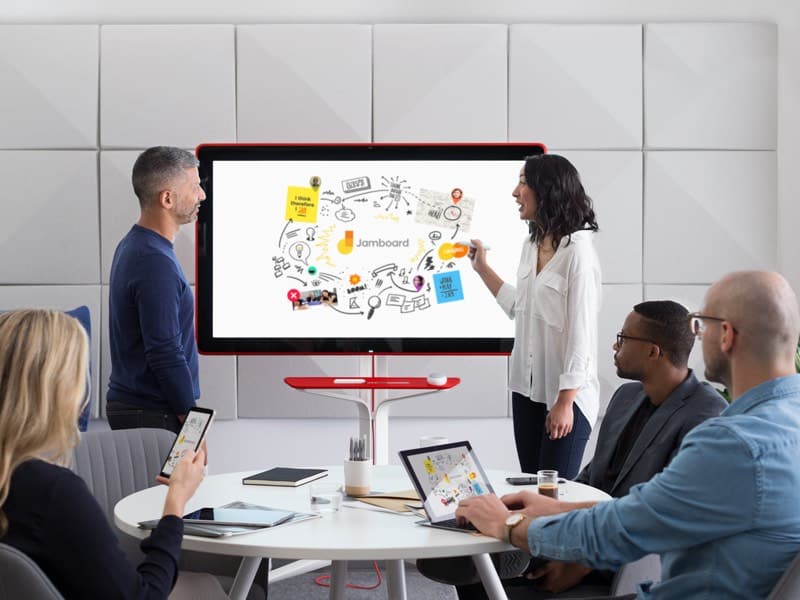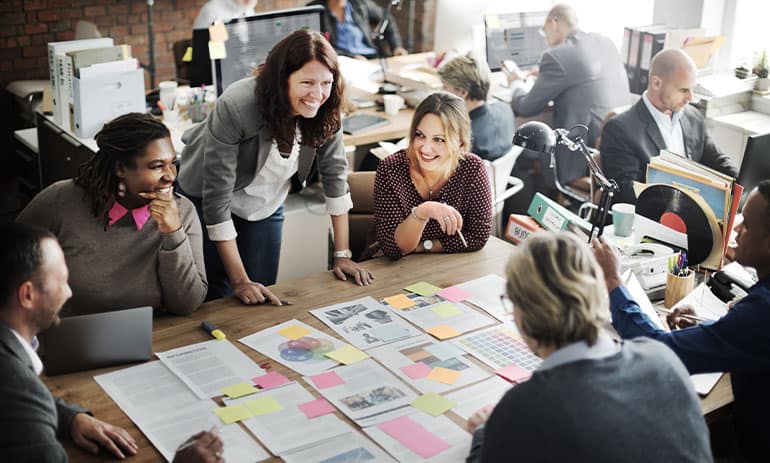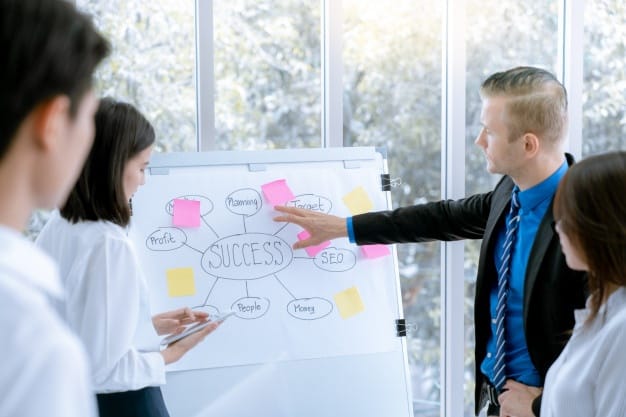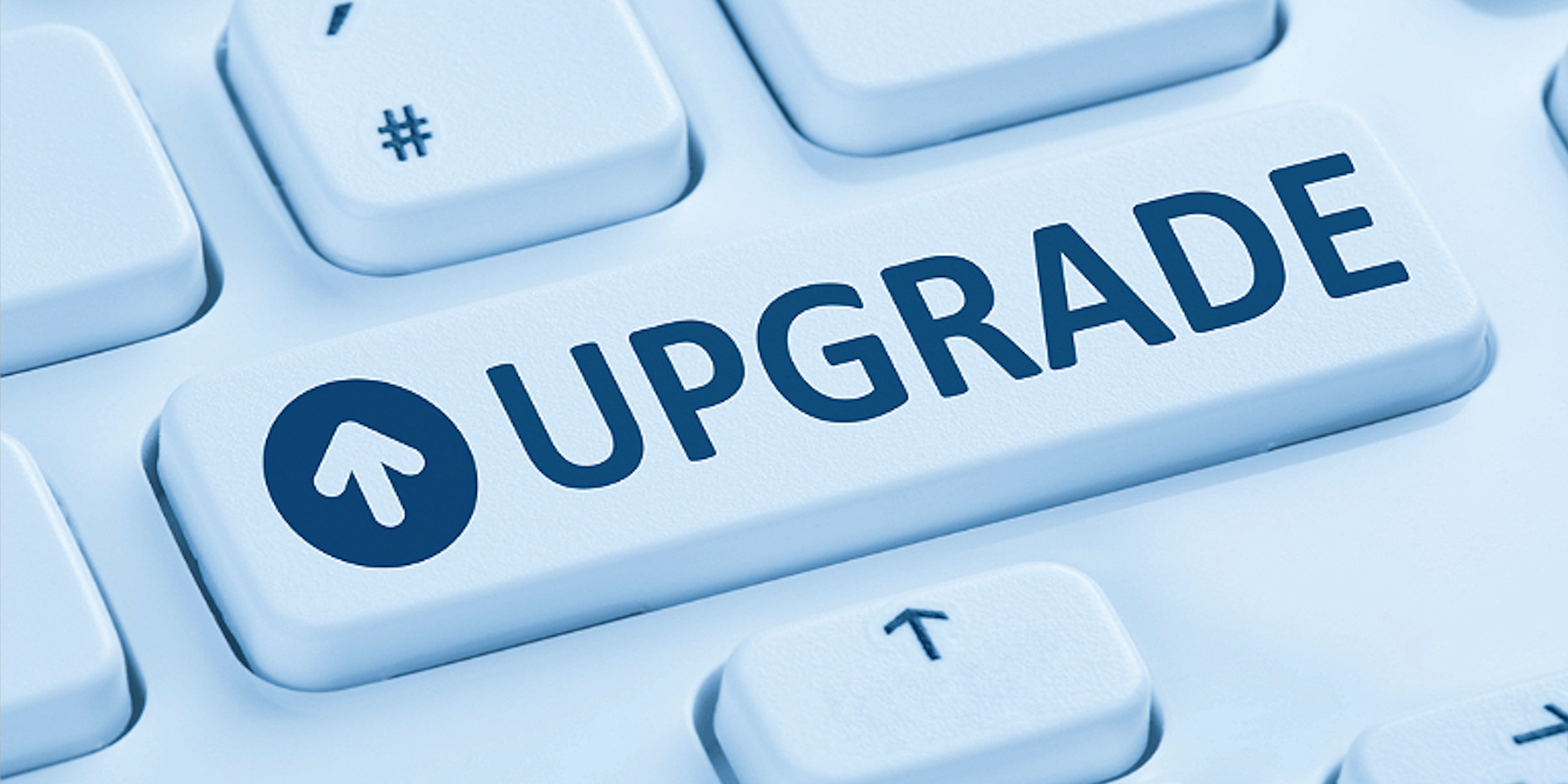Meetings are great opportunities to innovate, solve problems and make decisions with the collective intelligence of a group. On the other hand, meetings are also a frequent source of frustration and many people simply prefer to avoid meetings to protect their productive working hours.
This is where facilitation skills come into the picture – facilitation skills is the art of making meetings participative and more effective.
So, what is it exactly, and what skills do you need to become a facilitator?
Watch following 1-hour webinar to gain a deeper understanding of the role of a facilitator and the 2 main facilitation skills:
What is the role of a facilitator?
A facilitator has a wide range of tasks to perform in order to ‘make things easier’ for people who participate in a facilitated discussion:
- Support individuals within a group in understanding their common objectives.
- Help people collectively move through a process.
- Structure conversations and apply appropriate group facilitation techniques to keep discussions effective.
- Foster participation and get people to come up with ideas, thoughts and perspectives that add value.
- Get all individuals in the room to feel like they are in a group with a shared interest.
Your key responsibility as a facilitator is to create this group process and an environment in which it can flourish, and so help the group reach a successful decision, solution or conclusion.
What does a facilitator do?
A facilitator is a person who essentially sets all the right coordinates for a meeting or workshop to take place and produce results. The process may vary depending on the situation, but most often, a facilitator has the following responsibilities when engaging in workshop or meeting facilitation:
- Design and plan the group process, and select the tools that best help the group progress towards that outcome.
- Guide and control the group process to ensure that:
- There is effective participation.
- Participants achieve a mutual understanding.
- Their contributions are considered and included in the ideas, solutions or decisions that emerge.
- Participants take shared responsibility for the outcome.
- Ensure that outcomes, actions and questions are properly recorded and actioned, and appropriately dealt with afterwards.
Design and Plan
The cornerstone of facilitation is understanding what the objectives of the session are so you can work towards achieving them. Once you know the objectives, it is time to design the right group process and select the proper facilitation techniques that will help you achieve the outcomes. Having a sound agenda will help you stay confident and make adjustments as needed during the event.
Whether you’re planning a straight-forward meeting, or a complex event over several sessions or days, it’s important to always keep in mind the outcome – and how you are helping the group to reach it.
If the event spans multiple sessions and topics, make sure that you are clear about both the desired outcome and process for each one. And make sure that you know how the outcome of each session or topic contributes to the outcome of the event overall.
Guide and Control
When the session starts, it is time to guide the group through the designed process, encourage participation and help the group achieve its goals. Here are some of the most important elements of what a facilitator specifically does during a session:
- Set the context and ground rules: This is about making sure that everyone is on the same page concerning goals and the agenda of the session and ensuring everyone is aware of, and agrees upon, the rules of the meeting (Rules are created about respecting others’ opinions, how questions will be answered, etc.). Facilitation best practice includes leading by example – setting the ground rules is a great place to start.
- Encourage participation: Create an environment where all participant feels encouraged to share their opinions. This may involve breaking the ice, helping people warm up to the meeting and acknowledging contributions of participants to the conversations. This is one of the most important group facilitation skills a facilitator can have.
- Facilitate discussions: Staying neutral, you will help kick-off and round up conversations, highlighting points of consensus and summarising key takeaways. Intervene when necessary and help the group clarify outcomes.
- Hold the time and space: While guiding the group through the different steps of the process, maintain a focused and participative atmosphere. Take care of timing and keep the environment supportive to ensure productive discussions.
- Keep an eye on the efficiency of the group work and adjust the process if necessary. If you notice that cooperation falters or the process is stuck, it is your responsibility to find the right techniques to adjust the plan and help get the group back on track. Group facilitation isn’t easy, but by being aware of the process and alert to what is going on in the room, a workshop facilitator can help it be successful for everyone.
Record and Action
Last but not least among the responsibilities of a facilitator is the recording of outputs, and of bringing these together, sharing them, and making sure they are actioned.
The key to successful recording of outputs from an event is to be clear about what will be recorded, how and by whom. Make sure that people’s responsibilities are 100 percent clear, whether they are yours or others’ involved.
How can I improve my facilitation skills?
It’s probably needless to say, the best way to get better at facilitation is to practice, practice, practice! Over hundreds of hours of meeting facilitation, you will encounter a myriad of different situations in group dynamics: heated debates, opinionated participants, power dynamics between people, etc. The broader your facilitation toolbox is, the more skilled you will be in applying the right processes to guide each unique group in its thinking.
However, there are a few ways you can accelerate your learning in the realm of facilitation:
- Co-facilitate with experienced facilitators: On-the-job learning from seasoned veterans is probably the most effective way to level up your skills. Strive to design facilitation processes together with other facilitators, and you will encounter different perspectives on how to design an effective group process. Co-facilitate discussions and you will gain first-hand experience in observing how different strategies work to manage conversations.
- Learn new tools and techniques: Keeping an open mind and staying ahead of the curve is important. Find time to learn and experiment with new tools and techniques to stay up-to-date. Read books, watch videos, look up online facilitation toolboxes and share best practices with colleagues.
- Get trained: You may consider attending our dynamic facilitation skills training, or get trained in specific facilitation frameworks or facilitation skills. Whether you are a beginner or a professional facilitator, facilitation training can help you grow and refine your practice.
At the end of the day, facilitation is more of an art than a science. The more you do it, the more sophisticated your skills will become! In many ways, the best facilitation training is being on the job as a facilitator.
To be an effective facilitator you must know when to take a leadership role, and when to be neutral and take a back seat. This is a difficult balance to maintain! The key to being proficient in the role is to plan and guide the proceedings effectively, and remain focused on the group process and outcomes, rather than specific content and opinions involved.
Facilitation is an interesting, rewarding and important role to take on. When facilitating, take time to think about the process and agenda, and learn the skills you need to take the event through to a successful conclusion. Take pride in the role of facilitation, and enjoy watching the ideas, solutions and successful outcomes flow!
Articles Sources:





